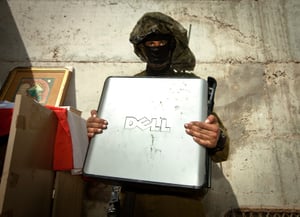
As Israel's war with Hamas enters its ninth month, a crucial gap is emerging between the country's vaunted tech sector and its military needs. The conflict has exposed vulnerabilities in Israel's defense capabilities, particularly in areas like drone detection and counter-measures.
Y., a computer vision AI engineer and army reservist, encountered this disconnect firsthand. After developing a smartphone app to warn soldiers of incoming drones, he found himself stymied by bureaucratic hurdles. "I'm talking to soldiers on the ground who tell me that if it works, I want it tomorrow. But the defense establishment guys tell me the soldiers don't need it," Y. says. His experience echoes the frustrations of many in Israel's tech community.
The irony is palpable. Israel, known globally as "Startup Nation" for its thriving tech ecosystem, struggles to integrate this innovation into its defense sector. The challenges are multifaceted: lengthy development cycles, risk-averse procurement processes, and a culture that often favors established defense giants over disruptive startups.
Moshik Cohen, a tech entrepreneur with extensive military R&D experience, puts it bluntly: "Our defense system is broken. From strategic management, through procurement and equipment, to politicking, as a system, it's broken."
The stakes are high. The October 7 attack by Hamas exposed critical gaps in Israel's defenses. It "blinded Israel’s $1 billion high-tech Gaza border wall by dropping bombs from cheap consumer drones onto the wall’s camera and sensor towers. Autonomous cannons stationed on the towers were cut off from targeting data and couldn’t respond. Officers in command and control bunkers couldn’t picture the situation or direct forces" as reported by The Times of Israel.
As the conflict has expanded to multiple fronts, the demand for battlefield innovations has surged. Yet, the defense establishment's ability to rapidly supply these innovations remains unclear.
There are some signs of progress. New initiatives like the "tech commando unit" and collaborations between universities and the Defense Ministry show promise. But these remain exceptions rather than the rule.
"Israel needs to bridge the divide between Startup Nation innovation and military might," says Hamutal Meridor, a veteran of Unit 8200 and former general manager of Palantir's Israel operation. "If it does, it could emerge stronger and smarter. But tough bureaucracy can stifle the entire sector."
The path forward isn't simple. It requires balancing secrecy with collaboration, streamlining procurement processes, and creating new funding models for defense tech startups. Some suggest creating "defense innovation sandboxes" where startups can develop and test using real military data without compromising secrets.
Thousands of reservist techies who have seen combat up close see this as an urgent need on the ground: "We're creating tools to protect our soldiers and bring them home alive," one entrepreneur says.
The outcome of this struggle to integrate startup innovation into Israel's defense capabilities could have far-reaching implications, not just for the current conflict, but for the country's long-term security and its position as a global tech leader.
* The Times of Israel contributed to this article.





























0 Comments